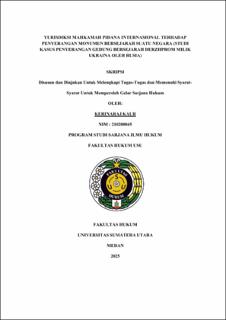Yurisdiksi Mahkamah Pidana Internasional terhadap Penyerangan Monumen Bersejarah Suatu Negara (Studi Kasus Penyerangan Gedung Bersejarah Derzhprom Milik Ukraina Oleh Rusia)
Jurisdiction of the International Criminal Court Over Attacks on a Nation’s Historical Monuments (Case Study of the Attack on Ukraine’s Derzhprom Historical Building by Rusia)

Date
2025Author
Kaur, Kerinaraj
Advisor(s)
Leviza, Jelly
Alhayyan, Riadhi
Metadata
Show full item recordAbstract
Armed conflicts in modern history often cause extensive destruction, not only to human lives but also to cultural heritage that forms the collective identity of nations. Historical monuments, despite their non-military status, are frequently targeted for political, military, or ideological purposes. Such destruction leads to the loss of historical, architectural, and symbolic national values. The International Criminal Court (ICC), established under the 1998 Rome Statute, holds jurisdiction over serious international crimes, including war crimes involving deliberate attacks against cultural property. This research examines three main issues: (1) the ICC’s competence in resolving attacks on historical monuments in a state; (2) the international legal framework for the protection of cultural property under the 1954 Hague Convention and the 1970 UNESCO Convention; and (3) the ICC’s competence in disputes concerning cultural property in the case of the Derzhprom Building attack in Ukraine by Russia under the 1998 Rome Statute.
The study adopts a normative juridical method with statutory and case approaches, drawing on primary legal materials (the 1998 Rome Statute, the 1954 Hague Convention, the 1970 UNESCO Convention, and the 1949 Geneva Conventions), secondary legal materials (books, journals, and prior research), and tertiary sources (legal dictionaries and encyclopedias).
The findings indicate that the ICC has the authority to prosecute individuals responsible for the destruction of the Derzhprom Building, as the act meets the elements of war crimes under Article 8 and Article 12 of the Rome Statute. The international legal framework provided by the 1954 Hague Convention and the 1970 UNESCO Convention affords special protection to cultural property in armed conflict. ad hoc acceptance of ICC jurisdiction enables the Court to process the case. These findings emphasize the necessity of strengthening international legal enforcement to safeguard the world’s cultural heritage from the devastation of armed conflict.
Collections
- Undergraduate Theses [3138]
